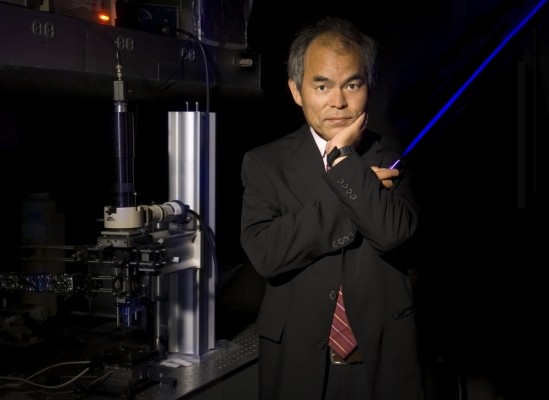Blue LED pioneer Nakamura becomes UCSB’s sixth Nobel laureate
IN THIS ARTICLE
- South Coast Topic
- Erika Martin Author
By Erika Martin Tuesday, October 7th, 2014
Click here for the Business Times’ updated coverage.

UCSB professor and blue LED pioneer Shuji Nakamura (photo courtesy of UCSB)
UC Santa Barbara professor Shuji Nakamura and two scientists based in Japan, Hiroshi Amano and Isamu Akasaki, were chosen as recipients of the 2014 Nobel Prize in Physics.
The committee selected the team for its invention of the blue light-emitting diode, or LED, which allows white light to be created in a manner that is both energy-efficient and visually pleasing. Nakamura will speak at a press conference at 10 a.m. this morning on the UCSB campus.
“I am very honored to receive the Nobel Prize from The Royal Swedish Academy of Science for my invention of the blue LED,” Nakamura said in a press release. “It is very satisfying to see that my dream of LED lighting has become a reality. I hope that energy-efficient LED light bulbs will help reduce energy use and lower the cost of lighting worldwide.”
Nakamura has pioneered many scientific developments since joining UCSB’s Materials and Electrical and Computer Engineering departments in 2000. He is recognized for his advancement of semiconducting technology using gallium nitrides and world-reknowned as a pioneer in light emitters.
Nakamura is also the co-founder or Soraa, a Goleta-based firm making LED lamps built from pure gallium nitride substrates, and the co-director of the campus’s Solid State Lighting & Energy Electronics Center. He is the sixth faculty member at the university to win the Nobel Prize since 1998.
“As about one fourth of world electricity consumption is used for lighting purposes, the LEDs contribute to saving the Earth’s resources,” The Royal Swedish Academy of Sciences said in a press release. “The LED lamp holds great promise for increasing the quality of life for over 1.5 billion people around the world who lack access to electricity grids: due to low power requirements it can be powered by cheap local solar power.”
Nakamura left Japan to join the UCSB faculty in 2000, after taking an unconventional route to the world of academia. “I love research,” Nakamura told the Business Times in 2008. “It’s just ideas. Ideas are very important.”











